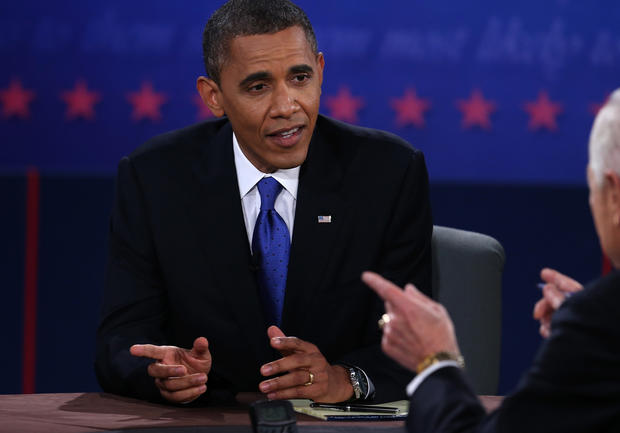To sequester or not to sequester?
President Obama's declaration at Monday's debate that the automatic spending cuts due to take effect at the beginning of 2013 "will not happen" surprised some lawmakers who say that the president's prediction belies a lack of progress made on averting the so-called "fiscal cliff."
By design, presidential debates aren't supposed to make news. The candidates generally stick to a battle-tested narrative, sharpening their case but studiously avoiding an unscripted moment that could usurp their chosen message.
But the president's remarks on the sequester were certainly news to some.
"I almost fell out of my chair when the president said, 'Don't worry, sequestration won't happen'," Sen. John McCain, R-Ariz, told Politico. "We've been begging the president to sit down with us to avoid what his own secretary of defense said would be a devastating blow to our national security."
The automatic spending cuts contained in the sequester - $1.2 trillion over a decade - resulted from the failure of last year's bipartisan deficit reduction committee to pass a deficit reduction plan. The law that established the committee tasked it with passing $1.5 trillion in deficit-reduction, and the sequester, which slashes equal parts defense and domestic spending, was established as a fallback in case the committee failed.
With the first round of cuts - $109 billion - slated to kick in on January 1, 2013, some lawmakers have been working to stave off the sequester by negotiating an alternative deficit reduction plan.
Sen. Saxby Chambliss, R-Ga., one of a bipartisan group of senators working to avoid the sequester, echoed McCain's surprise: "This was certainly news to us during the debate last night, and I can tell you it sent waves around Washington when he made that statement last night, but I understand they've backed off of that."
Indeed, after the debate, Obama aides and congressional Democrats fanned out to qualify the president's remarks, insisting that Mr. Obama's declaration is in accordance with his prior position on the issue.
"What the president said last night was a reiteration of what his position has long been," said White House press secretary Jay Carney on Tuesday. "The sequester that was designed and passed by Congress was never meant to become policy, it was never meant to be implemented."
But Carney's assurance - "move along, folks, nothing to see here" - stands in stark contrast to the president's previous indication that he expects Congress to abide by the deal they cut.
The sequester was negotiated to extract painful concessions from both parties - defense cuts from Republicans, domestic discretionary spending cuts from Democrats - so that everyone had some incentive to play ball. The near-universal loathing of plan B was supposed to elevate the imperative of plan A.
Democrats, in particular, saw the defense cuts in the sequester as powerful leverage - the rare piece of public policy that Republicans liked even less than tax hikes. The administration and congressional Democrats wagered Republicans would be so worried about slashing defense spending that they'd agree to generate revenue as part of a balanced approach to deficit reduction - an agreement that would be anathema in the absence of the pressure created by the sequester and the "fiscal cliff."
Now Democrats are worried that President Obama's remarks at the debate have swept the rug out from under them, depriving them of their best - and perhaps only - weapon to force Republicans to accept tax increases on the wealthy. After all, why should Republicans slay a sacred cow by accepting tax increases to avoid defense cuts that the president has now indicated will never take place?
"It's interesting that he took sequester off the table -- especially since he's the one who put it there in the first place," said a spokesman for Senate Minority Leader Mitch McConnell, R-Ky.
The president, immediately before waving away the likelihood of the sequester, disputed his role in negotiating the unpopular program, foisting responsibility squarely onto the shoulders of Congress.
"First of all, the sequester is not something that I've proposed," he said. "It is something that Congress has proposed."
Mr. Obama's message to Congress: This is your mess; I'm sure you'll find a way to clean it up.
"The president is confident that Congress will take the appropriate action in order to achieve a balanced deficit-reduction package in order to avoid these onerous cuts in both defense and non-defense discretionary spending," explained Carney.
But with just over two months before the advent of the "fiscal cliff," the president's confidence is not shared by everyone in Washington.
